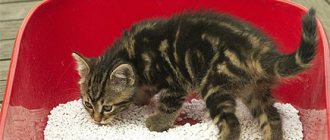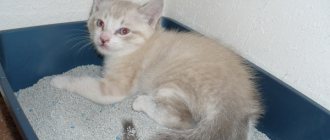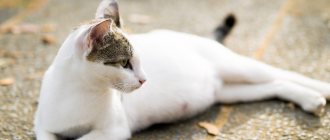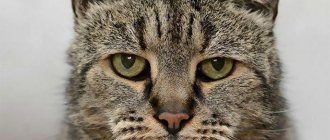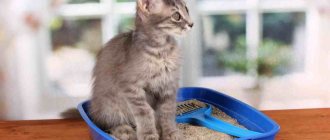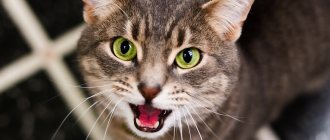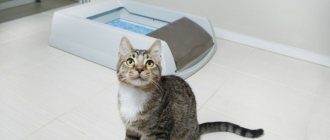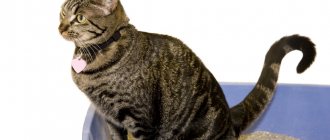How often does a cat go to the toilet: urination
Normally, the animal’s body should produce from 50 ml to 200 ml of urine, depending on the age of the pet.
The owner needs to know how often the cat should go to the toilet
Kittens have a small bladder capacity; they need to empty it up to 10 times a day, which is the norm. As the animal grows up, it needs the tray less and visits it 4-5 times a day.
Cats need to go to the toilet more often than cats, which is due to their physiology. With proper nutrition, cats pee up to 5 times a day, regardless of whether they are neutered or not. Cats urinate 3-4 times.
When urination becomes too frequent, a medical condition is not always present. Frequent visits to the litter box will be the norm for cats during pregnancy, as well as in the heat, when the animal drinks a large volume of water. In other cases, if you urinate too frequently, you should immediately contact a veterinarian.
Important! When an animal visits the litter box less than 2 times a day, it definitely needs veterinary care, since the condition indicates the development of pathology.
Difficulty defecating in kittens
The transition to adult food and the need to defecate independently, and even in a designated place for this, can lead to a number of difficulties. By how often a one-month-old kitten poops, you can determine whether he has difficulty defecating.
A prolonged absence of stool (more than two days) or problematic bowel movements indicates that the kitten is constipated. The reasons are poor nutrition or a small amount of water consumed by the animal. However, things can be much more serious. Constipation may indicate a disease, and not only of the gastrointestinal tract.
You can help your little pet by adding a little vegetable oil to his food. The presence of vegetables, cereals and fermented milk products in the diet will also have a laxative effect.
If these methods do not help, then use medicinal laxatives such as Duphalac, Festal, Espumisan or Vaseline oil.
In the case when these methods do not help, you have to use the most radical one: give your pet an enema. At home, you can only administer a specially designed microenema. Only a veterinarian gives a deep cleansing enema, since you yourself can harm the kitten.
How many times do kittens go to the toilet?
The frequency of bowel movements depends on the age of the pet . Kittens at the age of 20 days, when they begin to eat solid food, walk up to 6 times a day.
Be sure to read:
Antigadin for cats: purchased and homemade products
As they switch to adult food, the kittens' intestines get used to the new mode of operation, and by 3 months the animal requires no more than 4 bowel movements per day. By six months, digestion approaches that of an adult, and the animal needs a tray 1-2 times a day for major tasks.
Important! If kittens experience short-term diarrhea or constipation due to the introduction of new foods to the diet, but their general condition does not suffer, a visit to the veterinarian is not required.
Frequency of bowel movements
Despite a more organized defecation process, determining how often a one-month-old kitten should poop is still difficult, but not impossible. On average, this happens three to six times a day.
The difficulty of determining is that the stool in animals at this age is mushy. It can easily be confused with urination, especially if you are training your pet to use a litter tray.
In general, how often kittens poop at this age is not important. The main thing is that the structure of the feces does not contain undigested food residues, mucus, blood and other impurities that may indicate a malfunction of the digestive system.
If your kitten is active, playful, cheerful, and his belly is soft and not bloated, then you have nothing to worry about. So you are doing everything right!
How often should an adult cat go to the toilet?
Growing up, cats visit the toilet much less often: for adults, it is enough to empty their intestines once a day.
In some animals, defecation occurs once every 48 hours, and no pathologies are observed. This phenomenon is their feature, which does not harm health. Danger for the pet arises if feces are not excreted for more than 4 days.
The frequency of bowel movements depends on the age of the pet
Some cats sometimes leave small piles in different places out of revenge on their owner. There are many reasons for this behavior - from a change in the usual diet to a rude attitude. Incorrect behavior is eliminated not by treatment, but by establishing mutual understanding with your cat.
A diet with an excess of protein or fiber, as well as stressful situations, can affect the functioning of your pet’s intestines. In this case, we usually do not talk about pathology - the cat needs to be provided with a balanced diet or eliminate stress.
Why do problems with stool occur?
When planning to have a furry pet, future owners must understand the responsibility they take on for the life and health of their beloved cat. It is very important to provide proper care, create optimal living conditions, and think through the diet. The period of adaptation and socialization should be favorable, without stress. Any negative factors can weaken the immunity of animals and provoke changes in behavior and the functioning of internal organs and systems.
If an older kitten has a normal appetite, eats well, but there is no bowel movement, the fluffy does not go to the toilet, this condition can be provoked by various factors.
Causes of constipation in small kittens:
- Stress. A change of place of residence, a trip to the veterinary clinic, the presence of other animals in the house, and other stressful situations can lead to the absence of defecation. The kitten may not poop or go to the toilet for two or three days.
- Early weaning from the cat. Missing his mother in his new home, the fluffy may experience problems with bowel movements for up to four to five days. This is normal, but if the situation does not change, seek help from a veterinarian.
- Unbalanced nutrition, sudden changes in diet, consumption of foods rich in protein. In the first weeks and months, try to give your pet the same food that he received from his previous owners. Introduce new products gradually. You should not change your diet suddenly. If the baby is kept on a natural diet, do not suddenly switch the animal to ready-made food.
- Helminthic infestations. Constipation in young kittens can be caused by worms. Intestinal parasites disrupt digestive processes, worsen general condition, and can cause intestinal blockage.
You need to accustom your kitten to new foods and solid food gradually, in small portions. In order not to disrupt the digestive processes, solid food should be crushed and mixed with milk and boiled water to a creamy consistency.
Important! For kittens aged three to five weeks, the food used for complementary feeding should be at room temperature, liquid, semi-liquid consistency.
If your baby cannot poop for more than five to seven days or experiences discomfort during bowel movements, consult your veterinarian. The cause of this condition can be health problems, systemic disorders in the functioning of internal organs and systems. If your kitten often suffers from constipation, consult your veterinarian and adjust your pet’s diet.
© shutterstock
Elderly cats
Elderly individuals are less mobile, consume less food, which can cause digestive disorders. As a result, the norm is considered to be the appearance of feces in the tray once every two days.
The stool may have a soft or hard consistency. Their color is possible both light and dark. If an older pet feels fine and does not constantly scream due to pain or when going to the toilet, then there is no need to consult a veterinarian.
Be sure to read:
Wood litter for cat litter: types, the best companies, how to use, pros and cons
Host mistakes
You can find out how often a kitten poops at 2 months by how many times it visits the litter box. But the animal does not always choose a pot to satisfy its natural needs. This may be the owner's fault. Here is a list of possible reasons:
- Late trained to use the tray. The most optimal age for this is one month. Later it will be more difficult.
- Dirty pot. If you don't clean the litter box in time and change the filler, the kitten may go somewhere else. Remember that cats are clean animals!
- Wrong place. If the litter box is in a place that scares and the kitten doesn't like, he won't go in it.
- Another tray. If you decide to change your pet's litter tray, be prepared for the fact that he may refuse to relieve himself in the new one. In this regard, cats are monogamous.
- Foreign odors. The cat may not like the smell from the potty, and therefore he will refuse to go into it. Therefore, you need to exclude all flavors and wash the tray with plain water. It is also forbidden for several animals to go into one tray.
- Don't punish. This method will not help you accustom your pet to the tray, but will only instill fear of the owner.
- Doesn't shit where he eats. If your pet has chosen another place as a toilet, make his dining room there, after washing everything with odor eliminating products.
- Health problems. If you follow all the rules, but the kitten still shits in the wrong place, you should contact a veterinarian.
Diarrhea in a cat, causes
Diarrhea in cats develops quite often . A one-time loose stool should not frighten the owner, since it is usually a failure that occurs due to minor reasons that do not require a visit to a specialist.
Diarrhea in cats develops quite often
Diarrhea for 2 days or more requires therapy.
There are several main causes of diarrhea in cats:
- Feed intolerance. The animal’s body may not accept the food offered, even when it is of high quality. Most often, the phenomenon is observed when giving low-grade ready-made feed and milk. The problem can be solved by adjusting the diet.
- Sudden change in diet. The cat's intestines and stomach must gradually adapt to the new diet. If it is changed abruptly, diarrhea will easily occur due to irritation of the mucous membrane.
- Worm infestation. The toxins released by worms lead to poisoning, causing loose stools.
- Metabolic disease. This affects most processes in the animal's body, including the number of bowel movements and the density of feces.
- Bowel disease. Diarrhea most often develops with infectious lesions, but may also indicate tumor neoplasms and various ulcerative pathologies. A blood test will be required for diagnosis.
A veterinarian can determine the exact cause of diarrhea in a cat after an examination.
When do kittens start pooping?
The health of animals in childhood and adulthood directly depends on how well babies have defecation and urination.
Inexperienced owners may think that their pet does not go to the toilet until almost a month old, because they do not find traces of vital activity on the litter. However, like any living organism, the kitten empties its intestines and bladder.
This happens from the very moment of birth, but the cat helps babies go to the toilet by massaging the cubs’ stomach and anal area with their tongue, stimulating defecation. After the cub has done its business, the mother licks the urine and stool, which has a consistency similar to a thick paste.
Causes of constipation
Constipation in cats develops somewhat less frequently than diarrhea.
The following reasons can provoke this phenomenon:
- incorrect feeding system with excess protein;
- dehydration, when stool becomes too hard and cannot pass out of the intestines;
- lack of movement leading to digestive disorders;
- intestinal obstruction (constipation is not the only symptom);
- the presence of hair in the intestines;
- severe stress (leads to constipation and diarrhea equally);
- hernias;
- tumors of a malignant or benign nature.
Giving an animal a laxative until the cause of the disorder is determined is unacceptable. The veterinarian will determine how to properly solve the problem.
What if there are deviations?
Deviation from the norm in the number of visits to the tray requires mandatory consultation with a veterinarian. It is important to quickly determine the cause of the problem in order to prescribe treatment.
Be sure to read:
How to remove the smell of cat urine: products for removing acrid odors from pets
A number of diseases can be successfully treated at the beginning of their development, but in an advanced form they can most likely lead to the death of the pet.

